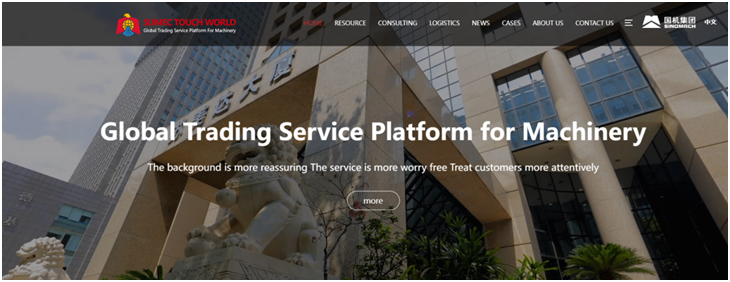In the current era of accelerating globalization and the rapid development of digital technology, digital trade is emerging at an astonishing pace and has become a crucial force driving global economic growth. It not only reshapes traditional trade models but also brings unprecedented opportunities and transformations to various industries.
Digital trade refers to the trade of goods and services ordered or delivered through digital means. Its connotation is rich, encompassing goods and services that are digitally ordered but physically delivered, such as purchasing books in an online market or booking an apartment, as well as digitally delivered trade, like movie and music streaming services. Data plays a central role in digital trade. It serves as a means of production and delivery, is itself a tradable asset, and is a key element in organizing the global value chain.
In the field of global equipment trade services, SUMEC International Technology Co., Ltd. has also actively practiced and utilized the form of digital trade and established the online platform "SUMECTouch World". Through digital means, this platform brings together resources from various aspects such as suppliers, purchasers, finance, logistics, exhibitions, and industrial parks on an online platform, enabling users to enjoy one-stop services.
Compared with traditional trade forms, digital trade has many advantages. For example, it can effectively reduce international trade costs. Digital transformation enables enterprises to significantly reduce intermediate links through automated processes and online platforms, thus lowering transaction fees and time costs. This allows many small and medium-sized enterprises to participate in international trade, expanding their market participation and competitiveness. In addition, the widespread application of digital means such as e-commerce platforms, digital payment systems, and blockchain technology has made transactions more convenient and secure, giving rise to many novel business models. Take the sharing economy model as an example. Through digital platforms, idle resources such as houses and vehicles can be efficiently shared, creating new economic growth points. Moreover, driven by digital trade, emerging technologies such as artificial intelligence, cloud computing, and the Internet of Things have been widely applied to the global value chain, making it more efficient and intelligent. For instance, some large manufacturing enterprises use Internet of Things technology to monitor in real time the transportation status and inventory levels of goods in the global supply chain, achieving precise production and distribution and enhancing the efficiency of the entire supply chain.
The "SUMECTouch World" platform established by SUMEC International Technology Co., Ltd. possesses some of the above-mentioned advantages. When users have equipment procurement needs, they can directly find equipment products of different brands of the same type through the platform and make comparisons, saving a great deal of time. The digital exhibition platform within the platform gathers a lot of industry exhibition information, and users can also view exhibits online, allowing them to learn about the specific information of the exhibitions without having to go to the site, which is very convenient.
Data is the core of digital trade, and cross-border data flow is of vital importance to it. However, it is also accompanied by risks such as privacy leakage and cybercrime. Enterprises should strictly comply with domestic and international data security regulations. For example, China continues to optimize the supervision of data outbound, and enterprises need to have an in-depth understanding of and follow the relevant rules. During the processes of data collection, storage, transmission, and use, technical means such as encryption and access control should be adopted to prevent data from being stolen or misused.
The "SUMEC Touch World" platform of SUMEC International Technology Co., Ltd. is an online platform independently developed by the company. It has established a secure and reliable database, which can ensure the data security and privacy security of users during their use.
In addition, in the global digital trade market, the competition is extremely fierce. Chinese enterprises are faced with a complex international competitive environment. Leading enterprises are vulnerable to interference from non-economic factors, and small and medium-sized enterprises face intense homogeneous competition, with their profit margins being squeezed. Enterprises need to enhance their core competitiveness, create unique products or services through technological innovation, and at the same time, build a healthy competitive ecosystem. For example, in the international digital payment market, when enterprises expand overseas markets, in addition to dealing with local policy restrictions, they should also actively engage in differential competition with their peers, provide higher-quality services, and increase their market share.



